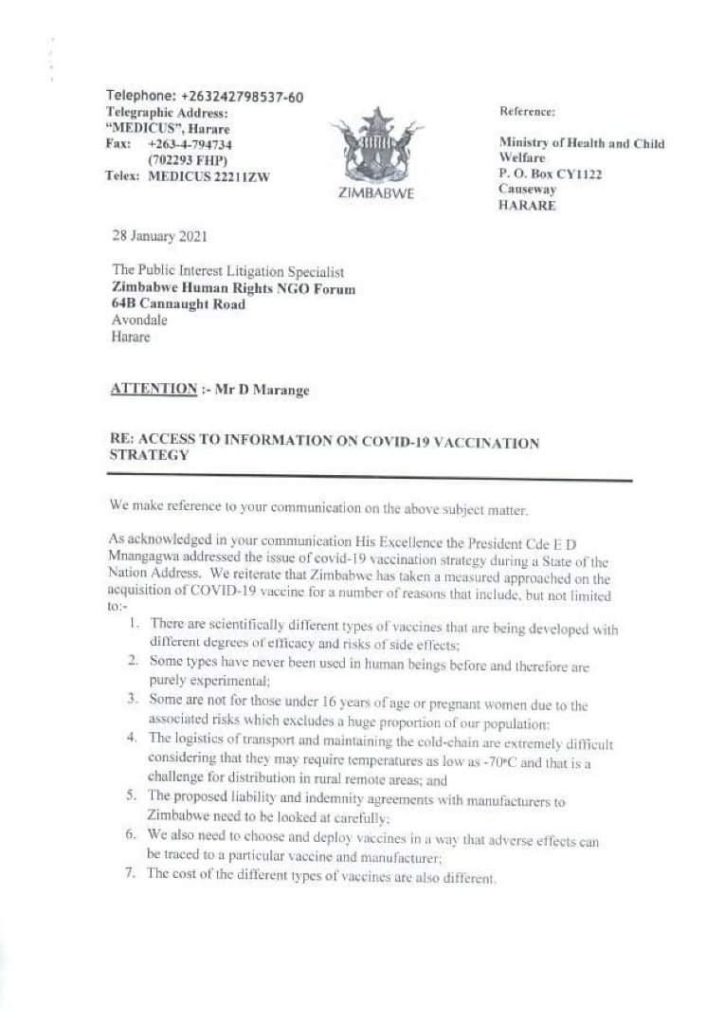Lack of transparency from the government on its plans to the plans to secure the Covid-19 vaccine is a cause of concern that may affect uptake, commentators have said.
According to scientists, vaccinating a significant proportion of the population is the ‘only realistic way’ to defeat the Covid-19 pandemic that has wreaked havoc locally and globally.
In Zimbabwe, the government recently announced it will avail US$100 million from its coffers and other support structures for the purchase of 20 million doses of Covid-19 vaccines to be used for vaccinating over 60 percent of the population.
This announcement followed an address on the national lockdown by Vice president and Health and Child Care Minister, Constantino Chiwenga, that the government would soon bring in Covid-19 vaccines, with a roll-out plan and a deployment strategy underway.
But this information is as far as it goes, as the government has not revealed publicly, which manufacturer the country had engaged, the financing agreement that was made and when exactly the vaccines would be arriving in the country.
In an interview with CITE, Community Working Group on Health (CWGH) Executive Director, Itai Rusike, said details surrounding the vaccination programme were still sketchy and required greater transparency.
He noted citizens must be part of the already ongoing country’s discussions to shape, participate and provide oversight of and over the national vaccination roll-out programme.
“There is a danger that political elites will undermine access of the Covid-19 vaccine to the deserving frontline health workers, the elderly and people with existing health conditions whilst prioritising themselves just like we are hearing now. This is why we need a people’s movement to fight for equitable access, equity and vaccine justice,” Rusike said.
Rusike noted that in recent months alone, the lack of transparency about the plans, delays in securing access to supplies, even urgent supplies and delays in confirming financing arrangements not shared in full, highlighted why the role of labour, frontline health workers, civil society, social movements, communities and people’s organisations was crucial.
“Our people will need to show great vigilance and social solidarity if we are to slow the rate of infection and make sure that our health facilities do not continue to be overwhelmed. Nevertheless, it is with some relief that we welcome the news that Zimbabwe has managed to acquire 3.2 million doses of Covid-19 vaccines for our health care workers on the frontline. But this is just a start. We need millions more,” he said.
The health expert said a massive roll-out effort to achieve herd immunity would be needed depending on whether Zimbabwe used a vaccine that requires single or double doses.
“Anywhere between 15 to 30 million doses will be needed. This cannot be done by the government alone. We, the people, especially the millions of us who live in the direst of circumstances, must be central to this effort. Our government’s poor record of public service delivery, alongside corruption, cronyism and mismanagement needs community participation in shaping and delivering a national vaccination roll-out programme,” he said.
President of Global Immunisation at the Sabin Vaccine Institute (a United States-based organisation), Dr Bruce Gellin concurred citizens must be involved in the decision process on the vaccination drive.
“The bottom line is vaccines don’t deliver themselves but what is important is the vaccination programme, who runs it, how are decisions made, how much it costs and a whole lot of things. What is essential is the end of that line that actually gives vaccines to people, turns them into vaccination, turns that into immunity then into protection,” he said while responding to questions on Covid-19 vaccines.
“People must know the basis of which those decisions are made. Communication is very critical about what vaccines are recommended. Part of this is how well the science is communicated and how well people want to listen to it and believe it, making sure vaccines are available and that they are delivered to their population to achieve coverage rates and population health.”
On January 26, 2021, the Zimbabwe Lawyers for Human Rights (ZLHR) dispatched a letter to the minister of health requesting to be furnished with information regarding Covid-19 vaccine procurement and rollout plan for the country.
In their letter, ZLHR asked Chiwenga to disclose the government’s plan, the status of the procurement plan and strategy of the Covid-19 vaccines including timelines, stating the information was necessary for the interest of public accountability and enforcement of citizens’ constitutional rights.
ZLHR asked the information to be published in both print, electronic media by not later than February 3, 2021, and in the event, the government fails to publish the information, the organisation said it would pursue other actions.
On January 28, 2021, a letter from the health ministry addressed to the Public Interest Litigation Specialist at Zimbabwe Human Rights NGO Forum, Darlington Marange that went viral on social media indicated the government was reluctant to shed more light on its acquisitions of Covid-19 vaccines.

Meanwhile, on his Twitter account, Minister of Finance and Economic Development, Professor Mthuli Ncube said the Covid-19 vaccine was cheaper than the costs of Personal Protective Equipment (PPE), economic costs of lockdowns, and socio-psychological effects.
“With some innovative financial structuring and use of the 2020 budget surplus, we can purchase vaccines to inoculate the entire population of Zimbabwe. The Government of Zimbabwe is in negotiations with various sources of vaccines such as COVAX, China, India, Russia, and the African Union initiative. The choice of vaccines to be acquired will be driven by availability, access, efficacy and pricing,” he tweeted.

